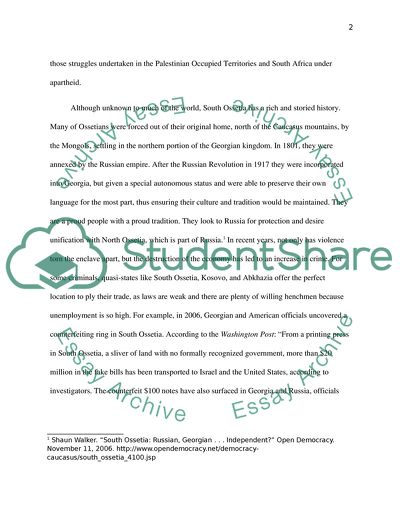Cite this document
(International Law: Georgia, South Ossetia and Abkhazia Essay, n.d.)
International Law: Georgia, South Ossetia and Abkhazia Essay. Retrieved from https://studentshare.org/law/1718139-discuss-under-international-law-whether-the-struggles-of-south-ossetia-and-abkhazia-represent-movements-for-self-determination-from-georgia-and-compare-and-contrast-with-plo-and-hamas-palestine-and-anc-south-africa
International Law: Georgia, South Ossetia and Abkhazia Essay. Retrieved from https://studentshare.org/law/1718139-discuss-under-international-law-whether-the-struggles-of-south-ossetia-and-abkhazia-represent-movements-for-self-determination-from-georgia-and-compare-and-contrast-with-plo-and-hamas-palestine-and-anc-south-africa
(International Law: Georgia, South Ossetia and Abkhazia Essay)
International Law: Georgia, South Ossetia and Abkhazia Essay. https://studentshare.org/law/1718139-discuss-under-international-law-whether-the-struggles-of-south-ossetia-and-abkhazia-represent-movements-for-self-determination-from-georgia-and-compare-and-contrast-with-plo-and-hamas-palestine-and-anc-south-africa.
International Law: Georgia, South Ossetia and Abkhazia Essay. https://studentshare.org/law/1718139-discuss-under-international-law-whether-the-struggles-of-south-ossetia-and-abkhazia-represent-movements-for-self-determination-from-georgia-and-compare-and-contrast-with-plo-and-hamas-palestine-and-anc-south-africa.
“International Law: Georgia, South Ossetia and Abkhazia Essay”, n.d. https://studentshare.org/law/1718139-discuss-under-international-law-whether-the-struggles-of-south-ossetia-and-abkhazia-represent-movements-for-self-determination-from-georgia-and-compare-and-contrast-with-plo-and-hamas-palestine-and-anc-south-africa.


